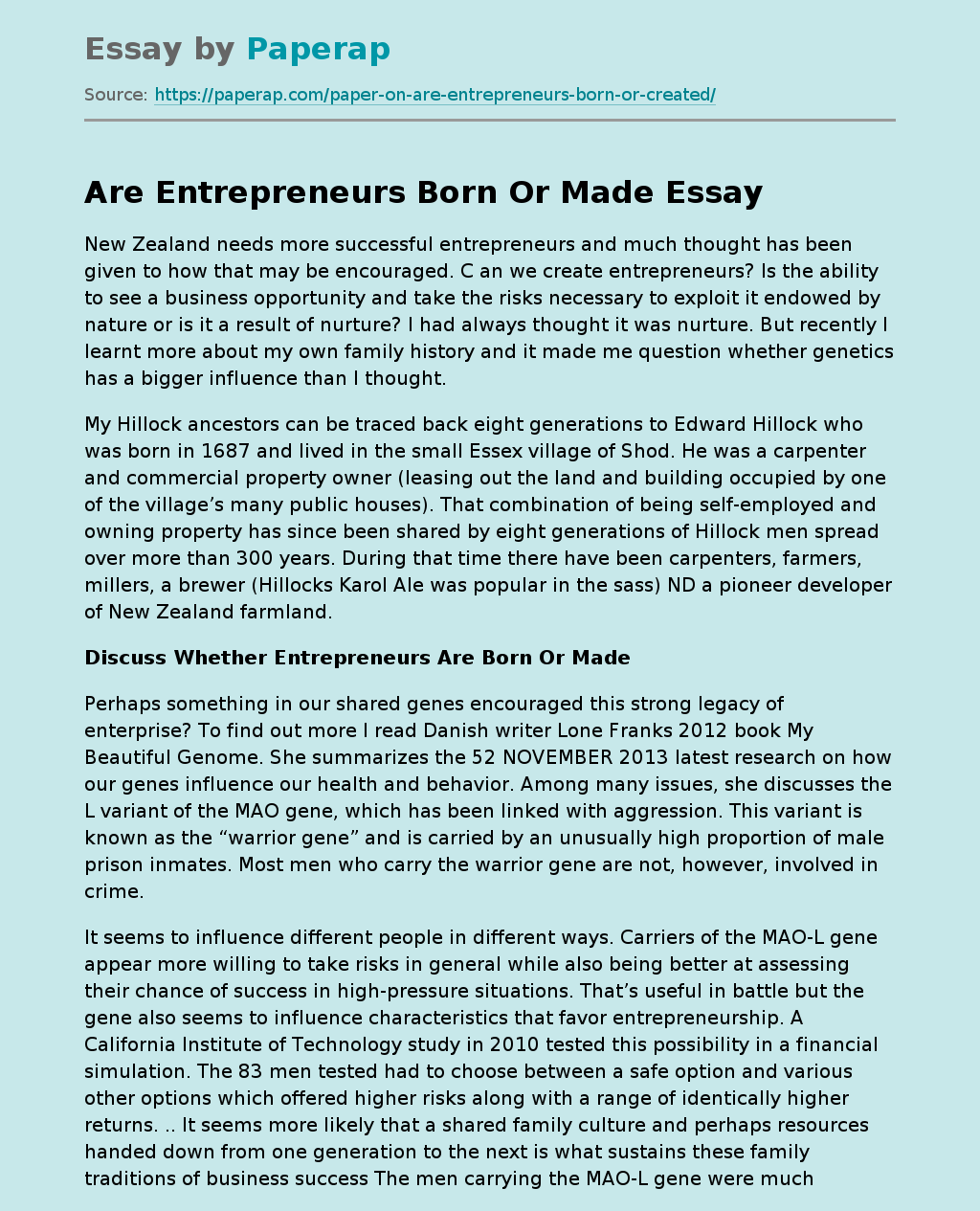Are Entrepreneurs Born Or Made
New Zealand needs more successful entrepreneurs and much thought has been given to how that may be encouraged. C an we create entrepreneurs? Is the ability to see a business opportunity and take the risks necessary to exploit it endowed by nature or is it a result of nurture? I had always thought it was nurture. But recently I learnt more about my own family history and it made me question whether genetics has a bigger influence than I thought.
My Hillock ancestors can be traced back eight generations to Edward Hillock who was born in 1687 and lived in the small Essex village of Shod.
He was a carpenter and commercial property owner (leasing out the land and building occupied by one of the village’s many public houses). That combination of being self-employed and owning property has since been shared by eight generations of Hillock men spread over more than 300 years. During that time there have been carpenters, farmers, millers, a brewer (Hillocks Karol Ale was popular in the sass) ND a pioneer developer of New Zealand farmland.
Discuss Whether Entrepreneurs Are Born Or Made
Perhaps something in our shared genes encouraged this strong legacy of enterprise? To find out more I read Danish writer Lone Franks 2012 book My Beautiful Genome. She summarizes the 52 NOVEMBER 2013 latest research on how our genes influence our health and behavior. Among many issues, she discusses the L variant of the MAO gene, which has been linked with aggression. This variant is known as the “warrior gene” and is carried by an unusually high proportion of male prison inmates.
Most men who carry the warrior gene are not, however, involved in crime.
It seems to influence different people in different ways. Carriers of the MAO-L gene appear more willing to take risks in general while also being better at assessing their chance of success in high-pressure situations. That’s useful in battle but the gene also seems to influence characteristics that favor entrepreneurship. A California Institute of Technology study in 2010 tested this possibility in a financial simulation. The 83 men tested had to choose between a safe option and various other options which offered higher risks along with a range of identically higher returns. .. It seems more likely that a shared family culture and perhaps resources handed down from one generation to the next is what sustains these family traditions of business success The men carrying the MAO-L gene were much more likely to take financial risks but only where the odds were in their favor – they were good at assessing risk while also being prepared to take on the risk to generate the return. Those men who did not carry the MAO-L gene typically chose the lower risk and lower return option and were tryingly averse to any potential downside.
This research shows there could be a genetic influence on entrepreneurship – at least in Menlo . The warrior gene (perhaps in time it will also be called the “entrepreneur gene”) cannot, however, explain multiple generations of fathers and sons starting and running businesses. That’s because the MAO gene is linked to the X-chromosome. Men inherit their single copy of the gene from their mother, not their father. Around one-third of all men of European descent carry the MAO-L variant so there is still a good chance that several f my male ancestors carried it, or that I carry it today.
With the rapid advances being made in genetic research it is possible that some other gene will be linked with entrepreneurship and help explain why some families (including the Hillocks) have such strong records of entrepreneurship. But unless that occurs it seems more likely that a shared family culture and perhaps resources handed down from one generation to the next is what sustains these family traditions of business success. Lone Frank explains that the expression of many genes is influenced by such environmental factors.
It appears that aggressive outcomes for those carrying the MAO-L gene are triggered by conditions such as mothers who smoke or drink during pregnancy or childhood trauma. In a different and more positive environment the gene variant could influence business success. Such an environment would of course also encourage success in those without the MAO-L gene. While there is evidence that some people have greater natural affinity for entrepreneurship it is likely that it is the environment in which people live or work that has the greatest influence.
For now we can’t alter our genes but we can create the environment in which more people are encouraged to set up new businesses and be more likely to succeed. . I am not aware of any similar research done on women who carry the MAO-L variant John Hillock is Director at Absolute Certainty Ltd.
Are Entrepreneurs Born Or Made. (2019, Dec 05). Retrieved from https://paperap.com/paper-on-are-entrepreneurs-born-or-created/

